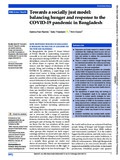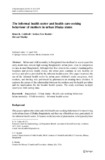Sabina Faiz Rashid
Browse by
Recent Submissions
-
Towards a socially just model: balancing hunger and response to the COVID-19 pandemic in Bangladesh
(BMJ Global Health 2020, 2020-06-01) -
Utilization of mobile phones for accessing menstrual regulation services among low-income women in Bangladesh: a qualitative analysis
(© 2017 BioMed Central Ltd., 2017-01-14)Background: As many as one-third of all pregnancies in Bangladesh are unplanned, with nearly one-half of these pregnancies ending in either menstrual regulation (MR) or illegal clandestine abortion. Although MR is provided ... -
Changing global policy to deliver safe, equitable, and affordable care for women's cancers
(© 2017 Lancet Publishing Group, 2017-02-25)Breast and cervical cancer are major threats to the health of women globally, particularly in low-income and middle-income countries. Radical progress to close the global cancer divide for women requires not only evidence-based ... -
Sex, pornography and medicines in the markets of Dhaka
(© 2012 Taylor and Francis, 2012) -
Informal markets in sexual and reproductive health services and commodities in rural and urban Bangladesh
(© 2012 Taylor and Francis, 2012) -
Influence of gender roles and rising food prices on poor, pregnant women's eating and food provisioning practices in Dhaka, Bangladesh
(© 2013 Reproductive Health, 2013)Background: Maternal malnutrition in Bangladesh is a persistent health issue and is the product of a number of complex factors, including adherence to food 'taboos' and a patriarchal gender order that limits women's mobility ... -
Explaining equity gains in child survival in Bangladesh: scale, speed, and selectivity in health and development
(© 2013 The Lancet, 2013)By disaggregating gains in child health in Bangladesh over the past several decades, signifi cant improvements in gender and socioeconomic inequities have been revealed. With the use of a social determinants of health ... -
Prevalence and experiences of intimate partner violence against women with disabilities in Bangladesh: results of an explanatory sequential mixed-method study
(© 2014 SAGE Publications Inc., 2014)This study was aimed to estimate the prevalence of intimate partner violence (IPV) in a sample of 226 women with disabilities living in four different districts of Bangladesh. It also explored the physical and psychological ... -
Creating a public space and dialogue on sexuality and rights: a case study from Bangladesh
(© 2011 Rashid et al; licensee BioMed Central Ltd., 2011)This article describes and analyses a research based engagement by a university school of public health in Bangladesh aimed at raising public debate on sexuality and rights and making issues such as discrimination more ... -
Internalized HIV/AIDS-related stigma in a sample of HIV-positive people in Bangladesh
(© 2012 International Centre for Diarrhoeal Disease Research, Bangladesh., 2012)Internalized stigma among people living with HIV/AIDS (PLHA) is prevalent in Bangladesh. A better understanding of the effects of stigma on PLHA is required to reduce this and to minimize its harmful effects. This study ... -
Beliefs and practices during pregnancy and childbirth in urban slums of Dhaka, Bangladesh
(© 2012 Choudhury et al.; licensee BioMed Central Ltd., 2012)Worldwide urbanization has become a crucial issue in recent years. Bangladesh, one of the poorest and most densely-populated countries in the world, has been facing rapid urbanization. In urban areas, maternal indicators ... -
Human rights and reproductive health: political realities and pragmatic choices for married adolescent women living in urban slums, Bangladesh
(© 2011 Rashid; licensee BioMed Central Ltd., 2011)In Bangladesh, particularly in urban slums, married adolescent womens human rights to life, health, and reproductive and sexual health remain adversely affected because of the structural inequalities and political economic, ... -
The sexual and reproductive health care market in Bangladesh: where do poor women go?
(© 2011 Reproductive Health Matters., 2011)In Bangladesh, the formal public health system provides few services for common sexual and reproductive health problems such as white discharge, fistula, prolapse, menstrual problems, reproductive and urinary tract infections, ... -
Innovation for universal health coverage in Bangladesh: a call to action
(© 2013 The Lancet, 2013)A post-Millennium Development Goals agenda for health in Bangladesh should be defined to encourage a second generation of health-system innovations under the clarion call of universal health coverage. This agenda should ... -
Exploring the context in which different close-to-community sexual and reproductive health service providers operate in Bangladesh: a qualitative study
(© 2015 BioMed Central Ltd., 2015)Background: A range of formal and informal close-to-community (CTC) health service providers operate in an increasingly urbanized Bangladesh. Informal CTC health service providers play a key role in Bangladesh's pluralistic ... -
From knowing our needs to enacting change: findings from community consultations with indigenous communities in Bangladesh
(© 2015 BioMed Central Ltd., 2015)Introduction: Indigenous peoples are among the most marginalized peoples in the world due to issues relating to well-being, political representation, and economic production. The research consortium Goals and Governance ... -
Qualitative insights into promotion of pharmaceutical products in Bangladesh: how ethical are the practices?
(© 2015 BioMed Central Ltd., 2015)Background: The pharmaceutical market in Bangladesh is highly concentrated (top ten control around 70 % of the market). Due to high competition aggressive marketing strategies are adopted for greater market share, which ... -
Close-to-community providers of health care: Increasing evidence of how to bridge community and health systems
(© 2016 BioMed Central Ltd., 2016) -
Limits and opportunities to community health worker empowerment: a multi-country comparative study
(© 2016 Elsevier Ltd, 2016)Background In LMICs, Community Health Workers (CHW) increasingly play health promotion related roles involving ‘Empowerment of communities’. To be able to empower the communities they serve, we argue, it is essential that ... -
The informal health sector and health care-seeking behaviour of mothers in urban Dhaka slums
(Journal of Population Research, 2014-04-22)Infant and child mortality in Bangladesh has declined in recent years but early death rates remain high among Bangladesh’s urban poor, even in comparison to rates in rural Bangladesh. Although they live close to the ...


